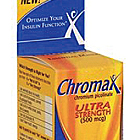 Chromium is a trace mineral that’s associated with better control of blood glucose levels. How it does that isn’t precisely known, but it appears to have something to do with promoting a tighter bond between insulin and cell receptors that makes insulin work more effectively. That’s important, not only for protection against diabetes but also because insulin in excess is linked to higher bodyfat.
Chromium is a trace mineral that’s associated with better control of blood glucose levels. How it does that isn’t precisely known, but it appears to have something to do with promoting a tighter bond between insulin and cell receptors that makes insulin work more effectively. That’s important, not only for protection against diabetes but also because insulin in excess is linked to higher bodyfat.
While many experts advise consumers that they should get all their nutrients from food, that’s a tough sell when it comes to chromium. Past studies show that even computer-assisted balanced diets still came up short on chromium. That’s because foods rich in the mineral are scarce. The richest natural sources are barley, brewer’s yeast, mushrooms, organ meats, ham, broccoli, oysters and some cereals; however, chromium can also be lost during food processing and cooking. In addition, various other natural substances interfere with chromium uptake into the body, including phytates, fiber, a high sugar intake (which causes chromium excretion) and other trace minerals that compete with chromium for uptake. Chromium requirements are increased by age, diabetes and excess stress.
Thus, chromium is one nutrient that it’s better to get as a supplement. Various forms of chromium supplements are available. Chromium picolinate, a metabolite of the amino acid L-tryptophane, and chromium polynicotinate, a chromium and niacin complex, are the two most common. For years manufacturers have waged a “chromium war,” in which they sponsored various studies showing that their version of chromium was superior because of enhanced uptake and retention. Ironically, you can only absorb about 10 percent of any dose of chromium at best.
A recent study sought to settle the controversy by comparing the effects of a 200-microgram dose of the following forms of chromium:
• Chromium chloride
• Chromium polynicotinate
• Chromium nicotinate-glycinate
• Chromium picolinate
Based on urinary levels of chromium, the superior form turned out to be chromium picolinate. It was absorbed significantly better than the other forms, more than twice as efficiently as the polynicotinate versions.
The authors noted that chromium picolinate also has an excellent safety profile. While it would appear that the picolinate version can now be crowned the “king of chromiums,” it should be noted that the sponsor of the study was a company called Nutrition 21. Its primary product is—chromium picolinate.
—Jerry Brainum
www.JerryBrainum.com
DiSilvestro, R.A., et al. (2007). Comparison of acute absorption of commercially available chromium supplements. J Trace Elements Med Biol. 21:120-24.




















You must be logged in to post a comment Login